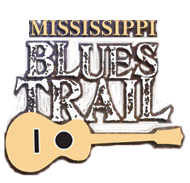Corner of 10 and 61
Corner of 10 and 61 - Leland
A major source of income for blues artists in the first half of the 20th century was tips. This corner, formerly the intersection of highways 10 and 61, was a profitable spot, particularly on Saturdays when people from the country came to town. Passengers on the “Planter,” a train that ran daily from New Orleans to Memphis, also stopped here to eat dinner and be entertained by Delta musicians.
Today Highway 61 is widely known as the “blues highway,” but early on Highway 10 was of equal importance to itinerant musicians. It crossed Greenville’s blues center and loosely followed the Southern Railway line through Leland, Dunleith, Holly Ridge, Indianola, Moorhead, Berclair, Itta Bena, Greenwood and on to points east. Highway 10’s importance declined somewhat with the completion of the considerably straighter Highway 82 in 1936.
Street corners were an important venue for blues artists in the Delta, particularly on Saturday afternoons when people from the country came to town to shop. Highways 61 and 10 met at this corner, making it a bustling center of commerce. Musicians played requests in exchange for tips, and street vendors sold hot tamales and fried fish to the gathered crowds. In the early 1900sLeland earned the nickname “the hellhole of the Delta” because of its many drinking and gambling establishments, which often featured blues. Even after Leland “cleaned up” it remained a hotbed for the blues, and this corner featured musicians regularly until the 1960s.
Early Delta blues performers who played here include master guitarist Eugene Powell (1908-1998), who recorded for Bluebird Records in 1936 under the name “Sonny Boy Nelson,” and guitarist Charlie Booker (1919-1989), a native of Sunflower County who lived in Leland during WWII. Late in his career, Nelson was an early influence on younger artists such as Keb’ Mo’.
In January 1952, Booker recorded four songs for Los Angeles-based Modern Records at a session in Greenville that featured harmonica player Houston Boines, drummer “Cleanhead” Love, and pianist Ike Turner, who was also serving as producer. One of the songs was “No Ridin’ Blues,” released on Modern subsidiary label Blues & Rhythm, a dark-themed song that suggested the influence of Charley Patton and referred to historic fires in Greenville and Leland. Booker’s record took on new meaning when, a month following its release, an entire block of Leland burned down. The song brought regional fame to Booker, who relocated to South Bend, Indiana, the following year.
content © Mississippi Blues Commission
[ BACK TO TOP ]

